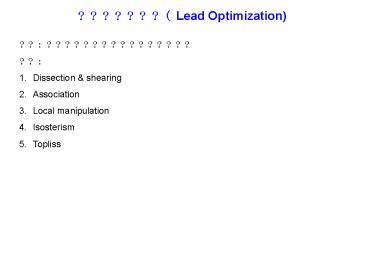???????(Lead Optimization) - PowerPoint PPT Presentation
Title: ???????(Lead Optimization)
1
???????(Lead Optimization)
- ??????????????????
- ??
- Dissection shearing
- Association
- Local manipulation
- Isosterism
- Topliss
2
1. Dissection Shearing
??
3
(No Transcript)
4
2. Association
???? Association principle???????????????????
???????(Twin drugs )?????????????????????,?????
???
5
?????
6
????
?????????
b-?????propranolol
Paracetamol ????
Aspirin
7
??????
Chlorambucil, ????,??CLL
Prednisolone, Cortisol???,??
Vitamin E
Retinoic acid
???,????
(??)
8
???????
???????
???? acetylcholinesterase inhibitor
Tacrine (Cognex ) treat Alzheimer's disease.
huprines
9
3. Local manipulation
- ?????
- ??
- ??
- ????
- ????????????
- ???????
10
?????(Homology principle)
- A-(CH2)n-B ???????
- ?????????????????????
- ?? gradation
- ?? alternation
- ?? inversion
???
100
90
80
R Duration of Anaesthesia (min)
H 11
CH3 23
C2H5 34
C3H7 49
C4H9 93
70
60
50
40
30
20
10
0
C1
C2
C3
C4
C5
C6
H
11
????
???
500
R Spasmolytic activity
CH3 8
C2H5 12
C3H7 24
C4H9 98
C5H11 240
C6H13 410
C7H15 490
450
400
350
300
250
200
150
100
50
0
C1
C2
C3
C4
C5
C6
H
C7
12
PAF-acether ????????
1400
1200
1000
800
600
400
200
0
5
9
11
15
17
19
3
Chain length
13
GABA????GABAA??????
70
60
50
40
30
20
10
0
n2
n3
n5
n4
n1
14
Alternation ??????????
100
80
60
40
Effect
20
0
n
4
5
7
6
8
9
10
15
???????????????
60
50
40
30
20
10
n
4
5
7
6
3
16
Inversion
R ???? ????
H -
CH3 -
C2H5
C3H7 -
i-C3H7 -
C4H9 -
i- C4H9 -
Carbachol ????
Dibutoline ????
17
?????
- ???????,??????? (????/????/????/?????/???????
- ???????,???????
18
????
19
????
???
diethylstibestrol
allenestrol
estradiol
??????????
20
????
- ????(Vinylogy principle)??? A-(CHCH)n-B,A?B
??????????????? - ?????????????????????????
- ??????????,????????????,??????????
- ?????????,???????????????????(????????)?
- ??????,A-(CHCH)n-B,???A?B?????
21
(No Transcript)
22
????,????
23
????????????
- ?????????????????, ????????
- ?????????????,???????
- ???????????,???????????????,?????
- ??????????,???????
H1 receptor antagonist
H1 receptor agonist
????
24
a-???????
???(?????)
b-?????
25
????????????,??????
26
??????????,??????????????,?????
??????
27
??????????,???????,?????????
28
?????????????????
?
29
???????
- ????(??????????,???????????????????)
- ??????????????
- -NH3, -NR3, -NO2, -CN, -COOH, -COOR,
-CHO, -COR, -F, -Cl, -Br, - -OH, -OR, -SH, -SR, -CHCH2, -CRCR2,
-C?CH - ??????????????
- -CH3, -CH2R, -CHR2, -CR3, -COO-
- ????(??????-????p-???,????????????)
- ????-R?-I???
- -NO2, -CN, -CHO, -COR, -COOH, -COOR,
-CONH2, -CF3 - ????R?I???
- -O-, -S-, -CH3, -CR3
- ????R?-I???
- -F, -Cl, -Br, -I, -OH, -OR, -OCOR, -SH, -SR,
-NH2, -NR2, -NHCOR
30
4. ?????? Bioisosterism
- 1919, Langmuir,????
- ??????,??????,????????????????,??????? Isosteres,
- ??????????????????
- N2?CO, N2O?CO2, NO3-?CO32-
- 1921, Hückle
- 1925, Grimm,????
- ???????????????,???????????????????,????????
31
Hydride displacement theory
- ??????????,????????????????????????????,?????????,
????????? pseudo atom - ????????,?????????????????,????????????????
32
- 1932, Erlenmeyer,????
- ?????????? boundary electrons ????? outer
electrons ?????????????? - ???????????????????????????
- 50 Friedman, ??????
- ?????????????,??????????????????????????,?????
????
- I F Cl Br I OH SH SeH NH2 CH3
- II O S Se Te NH CH2
- III N P As Sb Bi CH
- IV C Si N P As Sb (S)
- V -CHCH- -S- -O- -NH- (in aromatic ring)
- 70 Burger
- classical isosteres
- nonclassical isosteres
33
classical isosteres
- 1. Univalent atoms and groups
- a. CH3 NH2 OH F
- b. Cl PH2 SH
- c. Br i-Pr
- d. I t-Bu
- 2. Bivalent atoms and groups
- a. -CH2- -NH- -O- -S- -Se-
- -COCH2R -CONHR -CO2R -COSR
- 3. Trivalent atoms and groups
- a. -CH -N b. -P -As
- 4. Tetravalent atoms
- a. gtClt gtSilt b. C N P
- 5. Ring equivalents
- a. -CHCH- -S- b. -CH -N
- c. -O- -S- -CH2- -NH-
34
nonclassical isosteres
- 1. Hydroxy group
- OH NHCOR NHSO2R CH2OH NHCONH2 NHCN
CH(CN)2 - 2. Halogen
- F Cl Br I CF3 CN N(CN)2
C(CN)3 - 3. Ether
- -O- -S-
- 4. Carbonyl group
35
- 5. Carboxylic acid group
- 6. Thiourea
- 7. Spacer group
36
- 8. Catechol
- 9. Pyridine
- 10. Hydrogen
37
Bioisosteric replacements of the pyridine ring in
a series of factor Xa inhibitors
38
In vitro inhibition of acetylcholinesterasepyridi
ne, thiadiazole, and triazine replacement of the
pyridazine ring
39
- An indication could be given by the comparison of
the boiling points of these heterocycles assuming
that the more similar the boiling point is, the
most appropriate the bioisostere is. - A possible interpretation of these results can be
the fact that in the heterocyclic series, the
boiling point is correlated to the dipolar moment
of the molecule and that, for two heterocyclic
rings having the same aromatic geometry, the
similarity of the dipolar moments may represent
the dominant feature.
40
5. Topliss???































